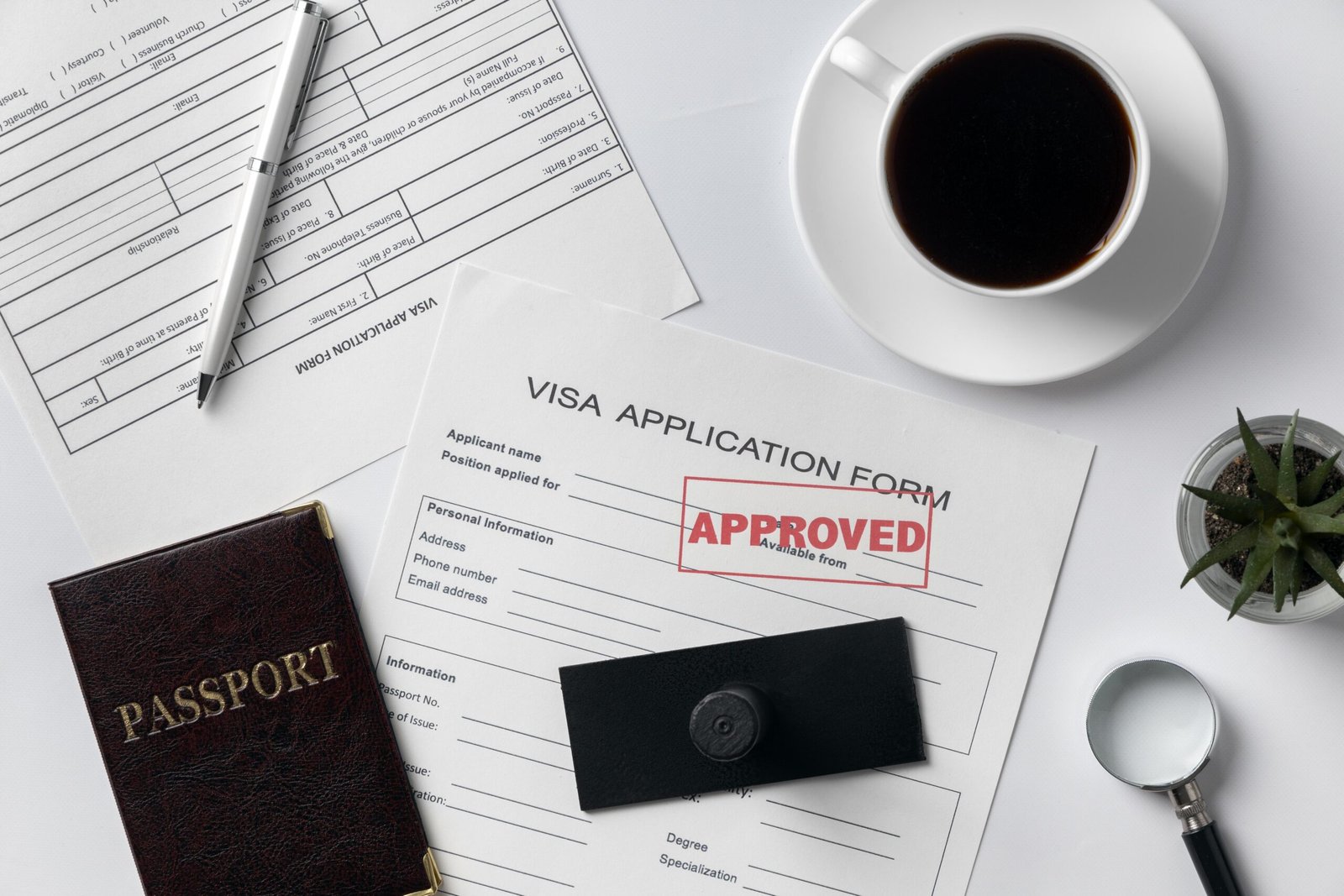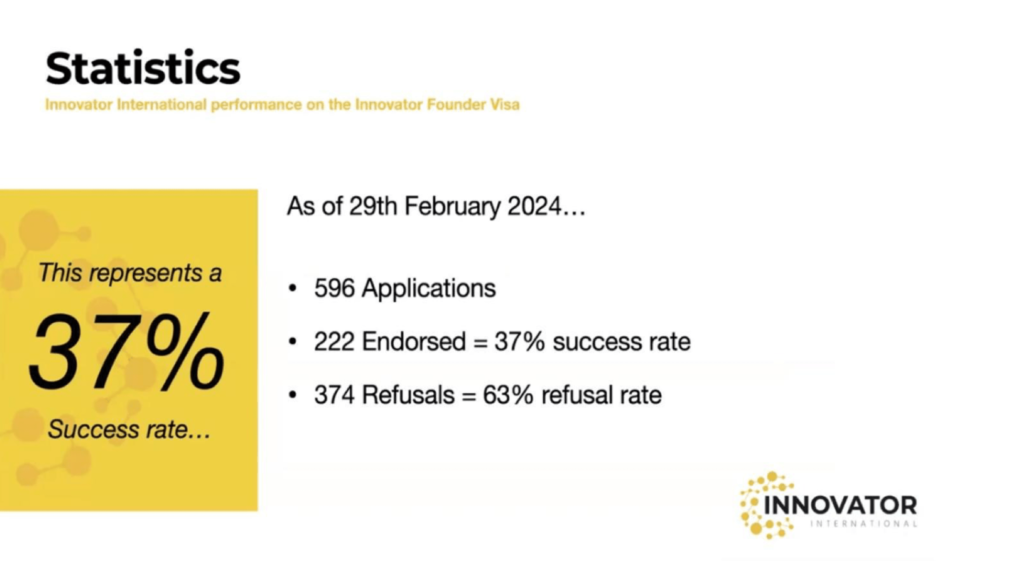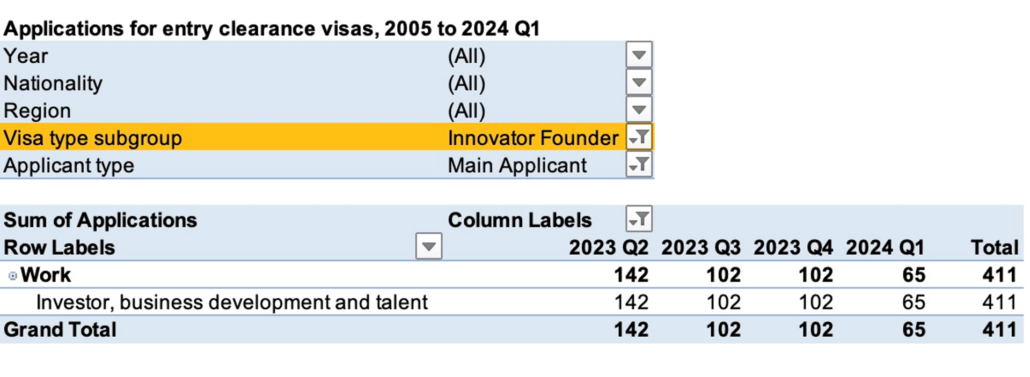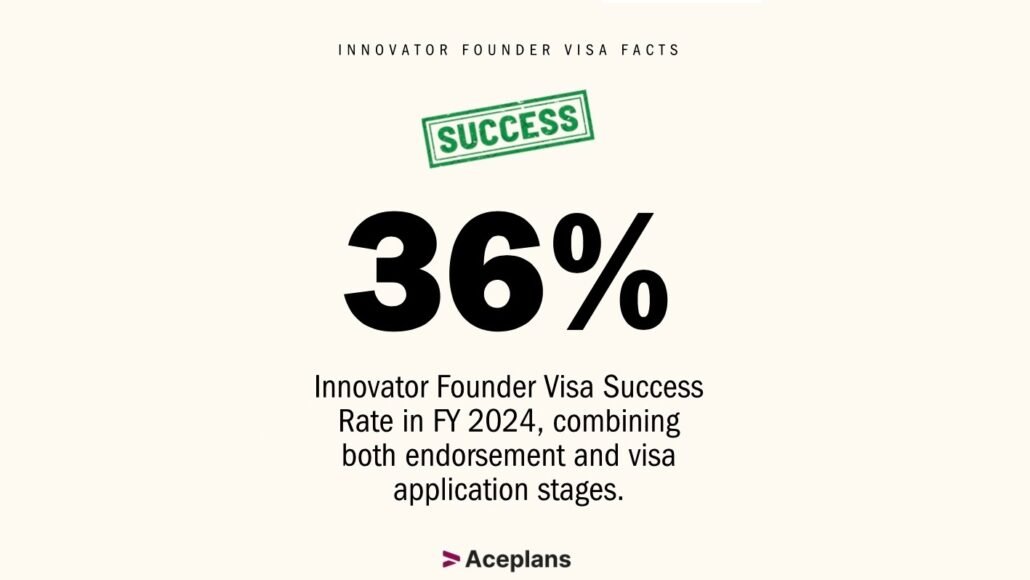The common question I have been asked is: What’s the innovator founder visa success rate? Some immigration consultants claim it’s higher, around 80%-90%, while others believe it to be low. But, what’s the reality? I took a jab at decoding this myth. Here are my findings:
Your application must be approved at two stages to get the Innovator Founder visa – i.e, the visa endorsement stage and visa application stage. At the visa endorsement stage, the success rate stands at 37% as of February 2024, as indicated by Innovator International in one of their webinars, Behind the Scene, available on YouTube. To put things in perspective, Innovator International is one of the four designated endorsing bodies by the Home Office. The endorser had received 596 endorsement applications as of February 2024, but only 222 were awarded the endorsement. While other endorsers have not explicitly disclosed their success rate, it is believed to be more or less the same as they enforce the same assessment criteria.
Furthermore, the Home Office recent data release confirms that there were 411 innovator founder visa applications that were made during FY 2024 (Apr 23 to Mar 24), of which 401 visas were issued, representing a 97.6% success rate at the visa application stage. This proves that there’s still a possibility of seeing a rejection at the visa application stage even though you have a valid endorsement letter, albeit the rejection rate being considerably low.
So, when the immigration consultants claim a higher Innovator Founder visa success rate, it is imperative to check whether they are referring to the “visa endorsement success rate” or the “visa application success rate” as both mean different things. The bottom line – the real Innovator Founder visa success rate in 2024 is estimated at around 36%, combining both stages – i.e., visa endorsement and visa application. This means only 36% of total applicants who started the innovator founder visa application process ended up getting a visa on their passport.
Importance of Innovator Founder Visa Success Rate
While it helps in understanding the historical Innovator Founder visa success rate, it neither has a positive or negative impact on your case. Each case is assessed individually based on its own merits and demerits. There are many other factors that will influence your success. These include innovation, viability and scalability of your business idea; your skills and background; strength of your business plan; and your genuine intentions to build and run an innovative company in the UK. You should focus on improving these factors instead of worrying about the innovator founder visa success rate.
Common Reasons for Endorsement Refusal
To improve your chances of success, it’s best to evaluate the common reasons for refusal and learn from others’ mistakes. Below are the common reasons to get the endorsement refusal:
Lack of Innovation
Lack of innovation is the most common cause of visa endorsement refusal. Based on our experience, approximately 9 out of 10 cases are rejected due to lack of proper innovation. But, what does that precisely mean? Let’s evaluate three different examples of lack of innovation that could prevent you from obtaining the innovator founder visa endorsement letter:
- Lack of genuine innovation: Some applicants randomly select a business idea and make it look innovative through integrating “AI/ChatGPT”. That’s totally wrong. You need to prove that you have contributed significantly in the research and development (R&D) of your product that solves a critical problem in the market.
- Similar products exist in the market: Another major cause of refusal on lack of innovation is that your product is an amalgamation of existing solutions. It’s important to have a unique product with a clear differentiation strategy in your business plan to elevate your chances of success.
- Easy to replicate: You have a genuinely innovative product with a clear differentiation strategy, but it can be easily replicated. To overcome this, you shall develop a clear IP (Intellectual Property) strategy in your business plan and identify patentable elements of your product, discouraging the competitors from replicating your product.
Lack of Relevant Experience and Skills
Applicants must demonstrate that they have the necessary skills, experience, and knowledge to execute the business plan successfully. Applications from individuals without a relevant background or sufficient expertise are likely to be declined. For example, a teacher proposing to launch an innovative business idea in the EdTech space is likely to be rejected because of lacking the essential IT-related skills and expertise.
Insufficient Financial Resources
Applicants must show they have adequate financial resources to support their business at start-up and during the subsequent operations until the company is financially self-sufficient. Applicants often misunderstand the “no minimum capital” requirement as “zero”. That’s not true. The “no minimum” requirement means that you need to invest the capital that is deemed appropriate for your start-up, whether it be £10,000 or £50,000 or even more. If the endorser is not convinced with your invested capital that it will suffice to launch and manage your start-up, the endorsement can be refused
Inadequate Market Research and Viability
If the business plan fails to demonstrate a thorough understanding of the target market, competitors, and potential challenges, it may be deemed unviable. Your business plan must explicitly identify your target market segments, backed with detailed market and competitor analysis to improve your chances of success.
Insufficient Evidence of Scalability
The business must have the potential for significant growth, including job creation and global market expansion. Applications that do not provide a clear and realistic plan for scaling the business are often rejected.
Weak Business Plan
A poorly constructed business plan that lacks detail, coherence, or fails to address key aspects such as marketing strategy, operational planning, and financial forecast is a common reason for refusal.
Failure to Demonstrate Economic Benefit
The business should contribute positively to the UK economy. If the proposed business is unlikely to provide significant economic benefits, such as job creation or attracting investment, it may not receive endorsement.
Tips to Avoid Refusal
Here are useful tips to avoid refusal:
- Prove it’s your idea: The endorsing bodies only work with genuine entrepreneurs. Prove to them that you are the person behind conceiving your idea. This includes providing all evidence of your R&D including product drawings, prototypes, collaboration with developers, surveys and any interaction that you might have with your potential customers to validate the concept, among others.
- Detailed Preparation: Ensure your Innovator Founder visa business plan is comprehensive, with clear details on innovation, market research, scalability, and financial projections.
- Professional Guidance: Always seek professional help from experts if you are not sure about the process. Many applicants have good business ideas, but they fail to transform it into an equally good business plan. If you are in the same situation, you should engage the services of a professional business planning company such as Aceplans to help you with crafting a strong business plan.
Understanding and addressing these common grounds for refusal can significantly improve your Innovator Founder visa success rate.
FaQs for Innovator Founder Visa Success Rate
What’s the innovator founder visa success rate?
The success rate for the Innovator Founder Visa varies depending on the stage of the application. At the visa endorsement stage, the success rate is 37% as of February 2024, according to Innovator International. However, at the visa application stage, the success rate is much higher at 97.6% for FY 2024. When combining both stages, the overall success rate for obtaining an Innovator Founder Visa is around 36%.
Is it hard to get an innovator visa?
The process for obtaining an Innovator Founder Visa involves two stages: endorsement and application. While the visa application stage has a high success rate of 97.6%, the endorsement stage is more challenging with a success rate of 37%. Therefore, it is essential to focus on meeting the endorsement criteria to improve your chances.
How long is the Innovator visa in the UK?
You can stay in the UK for 3 years if you either come to the UK on an Innovator Founder Visa or switch to this visa from another visa while in the UK.
What are the common reasons for the refusal of an Innovator Founder visa?
Common reasons for Innovator Founder visa refusal include lack of innovation, relevant experience, and sufficient financial resources. Innovation issues often arise from insufficient originality or easy replicability, while a lack of experience and financial misunderstanding also contribute to rejections. Applicants need a unique, well-supported business plan with adequate capital and expertise.
What are the disadvantages of the Innovator visa?
The major disadvantage of the Innovator Founder Visa is the requirement for the applicant’s business to be endorsed by one of the Home Office authorized bodies. This endorsement process is lengthy and complicated, making it a significant hurdle for applicants.





![List of E-1 and E-2 Treaty Countries [2024]](https://aceplans.com/wp-content/uploads/2023/04/list-of-treaty-countries-for-e1-and-e2-visas-500x383.webp)